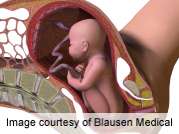Eating disorders linked to adverse perinatal outcomes

(HealthDay)—Maternal eating disorders are associated with adverse pregnancy, obstetric, and perinatal health outcomes, according to a study published in the October issue of theAmerican Journal of Obstetrics & Gynecology.
Milla S. Linna, M.D., from the University of Helsinki in Finland, and colleagues assessed pregnancy, obstetric, and perinatal health outcomes and complications inwomenwith lifetime eating disorders. Information was included for singleton births for women with broad anorexia nervosa (AN; 302 births), broad bulimia nervosa (BN; 724 births),binge eating disorder(BED; 52 births) and unexposed women (6,319 births)
The researchers found that, compared with unexposed women, women with AN and BN gave birth to infants with lower birth weight, while the opposite was seen in women with BED. Associations were observed for maternal AN with anemia, slow fetal growth, premature contractions, short duration of first stage of labor, very premature birth, small for gestational age, low birth weight, and perinatal death. Mothers with BN had increased odds of premature contractions, resuscitation of the newborn, and very low Apgar score at one minute. Positive correlations were seen for BED with maternal hypertension, long duration of the first and second stage of labor, and large-for-gestational-age infants.
"We recommend close monitoring ofpregnant womenwith either a past or current eating disorder," the authors write. "Attention should be paid to children who are born to these mothers."
Several authors disclosed financial ties to the pharmaceutical industry.
More information:Abstract
Full Text (subscription or payment may be required)
Copyright © 2014HealthDay. All rights reserved.

















